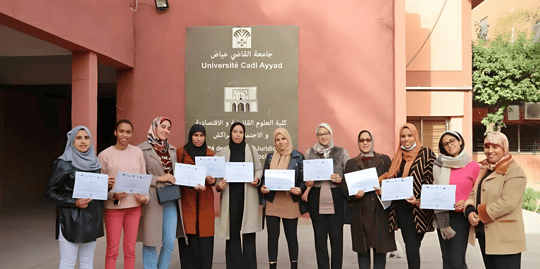Report – Communication with Students at the Legal Clinic in Marrakech


Ms. Amina El-Haijami, Project Manager of the legal clinic Cadi Ayyad run by the High Atlas Foundation (HAF), held a virtual discussion with student trainees, to explain the legal clinic’s work map. This began with an introduction to HAF, a Moroccan-American non-profit organization committed to promoting sustainable development through a participatory approach to support the local Moroccan population. The goal is to take action in implementing sustainable human development initiatives, among them the promotion of organic agriculture, women’s economic and self-empowerment, youth development, education, and health.
The legal clinic project is based on a partnership with HAF and Cadi Ayyad University, the Faculty of Legal, Economic and Social Sciences, and the Legal Clinic Association for Studies and Research, with the support of the National Endowment for Democracy (NED). It aims to train 67 research students with master’s or doctoral degrees in law, with the program extending from October 2021 to September 2023. This partnership is devoted to the development of the legal clinic to enhance the stereotypical image of the university as merely a center for science and scientific research, promoting openness to civil society.
The legal clinic leaves the theoretical milieu reality of scientific research and embraces the practical side by training students on the real problems experienced by Moroccan society, allowing law school graduates to receive training that qualifies them to efficiently enter some legal professions. They should also be able to provide legal support to vulnerable and marginalized groups within society through legal advice and legal assistance and dedicating themselves to the principles of voluntary work.
The beneficiaries of the legal clinic project, which operates in the Marrakech-Safi region, include civil society organizations (associations, cooperatives, etc.) and local leaders (representatives of groups, heads of associations and cooperatives, etc.) and then students of Cadi Ayyad University in Marrakech.
Among the objectives of the Legal Clinic Project are
- Identifying and selecting 20 civil society organizations, businessmen and community leaders to participate in the program.
- Delivering a series of monthly two-day workshops by experts over a six month period.
- Providing participants with the skills and techniques to identify barriers to progress in the change they hope to achieve, and visualizing the positive aspects.
- Setting priorities through participatory planning methods.
- Developing action plans for priority issues.
- Activating self-empowerment workshops for students and local communities.
- Preparing 30 strategies and an organizational action plan for each participating civil society organization to define their priorities, create a roadmap and pathways to enhance participation and access to justice for vulnerable groups, and monitor the progress of their projects.
- Opening information sessions for civil society, women, youth, and citizens, as appropriate.
Twenty-four media sessions will be held for each civil society organization targeted by law students, whose services revolve around legal aid and general guidance on the topics identified as priorities during the workshops.

The Foundation and the University will activate 12 mobile clinic initiatives where law students will travel to provide legal assistance in the targeted rural or semi-rural communities in the Marrakesh-Safi region. The visits will take an average of four hours and will consist of two parts, namely legal advice and information sessions. The Foundation will also evaluate the results of the program and recommendations for modifications, as well as the impact on civil society organizations, the university’s cooperation approach, the extent of students’ participation in community service learning, and the impact of the community process. Meanwhile, the Foundation’s staff and experts will present best practices and lessons learned from their experience.
The discussion became an approach to the actual participation of the students, and they contributed to the debate by asking questions on how to work with regard to self-empowerment: Will it take place through workshops? Is it only for female students and not for male students? Will the groups be divided according to their specialization? Is it possible to participate in all groups? As for legal advice and assistance, they asked the following: Will it be associated with the request, or will the student remain free to provide it? As long as the legal advice is according to the request of the beneficiary, is there the possibility of pleading by the legal clinic and civil society? What about writing articles? What are the most important problems that the legal clinic might face while out in the field?
Despite all the questions asked, Mrs. Al-Hijami explained and cleared the ambiguity in the minds of the research students regarding all the issues raised. She stated that the goal is to raise awareness of the relevant legal issues and policies and to support the important work of the legal clinic.
Ms. El-Haijami concluded the discussion in an optimistic atmosphere, planting the idea of initiative and volunteering in the dissemination of legal knowledge in the community. Thank you to all the partners that support this project.